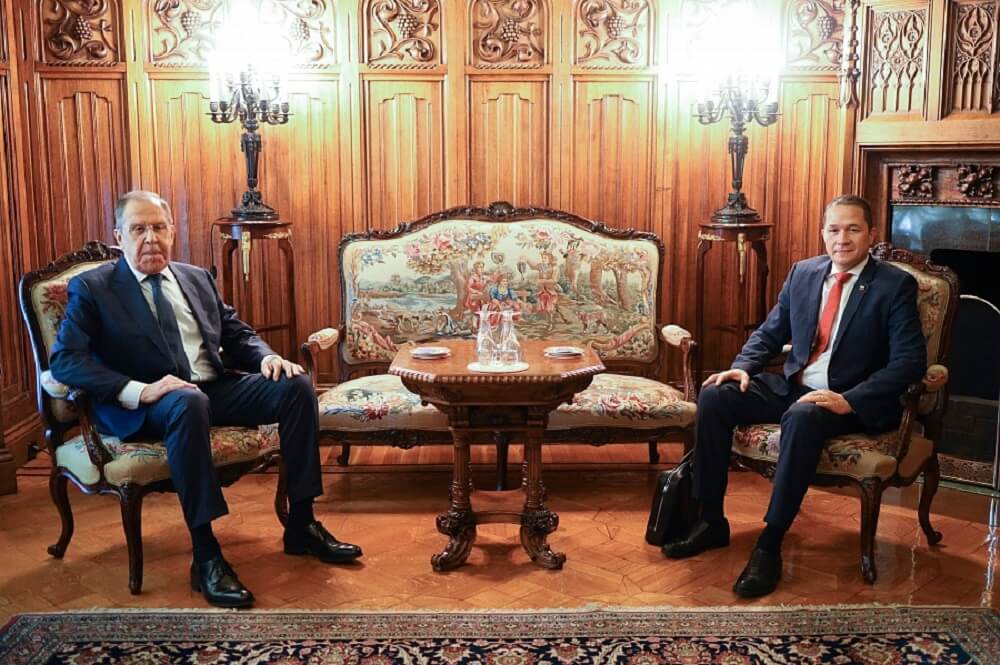In a joint press conference in Moscow on Monday, Venezuelan Minister for Foreign Relations Carlos Faría and his Russian counterpart Sergey Lavrov condemned the United States’ (US) “illegal sanctions” on both their nations. They also lambasted the US’ move to freeze sovereign states’ accounts as “a flagrant theft” and a “brutal violation of their economic and social rights.”
To this end, Lavrov hailed the Venezuelan economy’s ability to “withstand strong pressures,” and appreciated President Nicolás Maduro’s “responsible and effective policies” for bringing the country’s economy back “to the path of sustainable development.”
He also reaffirmed Russia’s continued support for the ‘defence’ of Venezuela’s “ national sovereignty” and its “right” to choose its own development path. To this end, he compared the US’ attempts to create a so-called “rules-based order” to 19th century colonialism, and called for respect for international law.
Los cancilleres de 🇷🇺🤝🇻🇪 acaban de sostener una fructífera reunión en Moscú. Sergey Lavrov y Carlos Faría confirmaron su intención de fortalecer aún más la asociación estratégica entre ambos países y ampliar el campo de la interacción activa en el ámbito internacional🌎🌍🌏. pic.twitter.com/1vMNdALCK6
— EMB₽V_Sergio (@EmbSergio) July 4, 2022
Echoing Lavrov’s comments on the resilience of their economies, Faría emphasised that the Russian economy “continues forward” despite the US’ “unilateral coercive measures.”
Faría also called on the United Nations to investigate the sanctions and the freezing of foreign assets.
The ideological camaraderie between the two allies was further exemplified through Faría’s criticism of the West’s “permanent injection of military technique” in Kyiv, claiming that the arms supplies have only ensured that “the conflict is maintained.” In this regard, the Venezuelan foreign minister appreciated Russia’s efforts to bring an end to the war through dialogue.
3/4 En nombre del presidente @NicolasMaduro, manifestamos nuestra solidaridad con Rusia. Venezuela condena categóricamente las medidas coercitivas impuestas contra su Gobierno y su pueblo. Nuestro llamado siempre será al respeto del derecho internacional pic.twitter.com/GowBsKMXjo
— Carlos Faria (@Fariacrt) July 4, 2022
Monday’s meeting also formalised various collaborative projects in energy, railway transport, civil aeronautics, military equipment, space technology, and pharmaceuticals. Enhanced space cooperation would enable Venezuela to place a station on the Russian global positioning system Glonass.
Lavrov and Faría also agreed to operate Venezuelan state-owned airline Conviasa’s Caracas-Moscow route on a weekly basis, instead of fortnightly as before.
Maduro’s support for Russia throughout the Ukraine war has been unwavering. In March, he slammed the sanctions on Russia as “madness,” “a crime,” and “an economic war.” He has strongly condemned the “destabilising activity” of the US and the North Atlantic Treaty Organization,” while pledging his “full support” for his Russian counterpart Vladimir Putin.
Maduro and Putin also recently reaffirmed their commitment to multilateral cooperation by establishing a ‘Group of Friends’ to safeguard the United Nations Charter.
4/4 Acordamos promover en la ONU el carácter ilegal de las medidas coercitivas y unilaterales contra nuestros pueblos, considerando entre otras cosas, que el bloqueo de las cuentas de estados soberanos, es una violación de derechos económicos y sociales de los pueblos. pic.twitter.com/sCHLPRaTNT
— Carlos Faria (@Fariacrt) July 4, 2022
Venezuela’s support for Russia’s territorial ambitions has historical precedents. For instance, Caracas backed the Kremlin in the 2008 Russo-Georgian war over South Ossetia. Venezuela has also bought hundreds of millions of dollars worth of arms and weaponry from Russia.
The US, meanwhile, has made various overtures over the course of the war to re-engage with Venezuela, and even offered sanctions relief by removing some Trump-era restrictions on its energy sector as it seeks alternative energy sources after banning all Russian energy imports.
The US has also stepped up diplomatic interactions, sending White House delegations to Caracas in both March and June. Though it has failed to nudge Venezuela to pivot away from Russia, these discussions have led to the release of two American detainees.
Nevertheless, it continues to push for free and fair elections and still recognises opposition leader Juan Guaidó as the legitimate president. To this end, Biden excluded the country, along with Cuba and Nicaragua, from the 9th Americas Summit in Los Angeles last month.
The US’ reluctance to fully relax its “maximum pressure” strategy has pushed Venezuela to seek closer alliances with not only Russia but also a host of countries in the Middle East and North Africa, which are less concerned about ideological differences. In fact Maduro visited Turkey, Algeria, Iran, and Kuwait last month following his exclusion from the Americas Summit.

